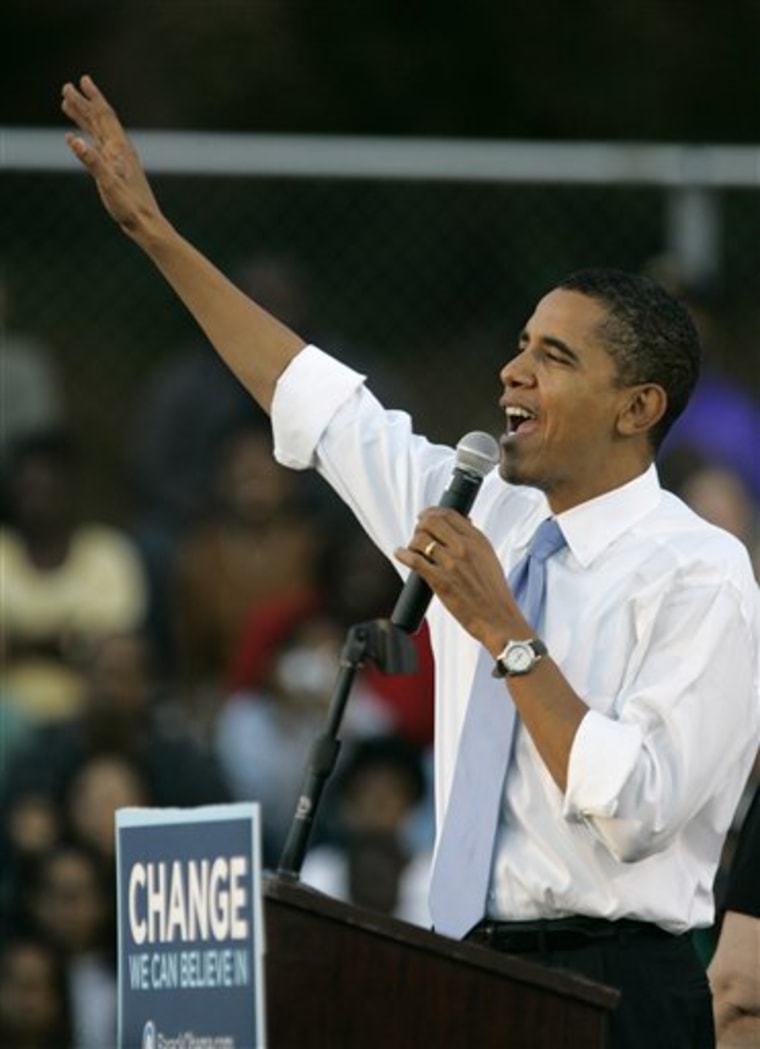Democrat Barack Obama introduced a Senate resolution late Thursday that says President Bush does not have authority to use military force against Iran, the latest move in a debate with presidential rival Hillary Rodham Clinton about how to respond to that country's nuclear ambitions.
Clinton's campaign accused Obama of playing politics instead of taking a leadership role from the outset.
Obama spokesman Bill Burton said the Illinois senator drafted the measure in an effort to "nullify the vote the Senate took to give the president the benefit of the doubt on Iran."
Burton was referring to an amendment sponsored by Sens. Jon Kyl, R-Ariz., and Joe Lieberman, an independent from Connecticut, that passed 76-22 on Sept. 26 and designates Iran's Revolutionary Guard as a terrorist organization.
Clinton's Iran vote
Clinton was the only Senate Democrat running for president to support the measure, and her rivals have argued that Bush could use it to justify war with Iran. Clinton insists her vote would not support military strikes and instead was a vote for stepped-up diplomacy.
Last week, the Bush administration declared the Revolutionary Guard a proliferator of weapons of mass destruction and announced new sanctions meant to isolate Iran. The Iranian government contends its nuclear program is aimed only toward providing nuclear power.
Clinton and 29 other senators wrote to Bush Thursday to tell him he has no congressional authority for war with Iran.
The four Democratic senators running for the White House split over whether to sign the letter. Chris Dodd of Connecticut added his support, while Obama and Joe Biden of Delaware declined.
The letter to Bush
The letter accuses Bush of "provocative statements and actions stemming from your administration with respect to possible U.S. military action in Iran."
"We wish to emphasize that no congressional authority exists for unilateral military action against Iran," it says. That includes the Kyl-Lieberman amendment, the letter says.
Obama missed the vote on the amendment because he was campaigning. Clinton spokesman Phil Singer said if Obama was so concerned about the amendment, he should have been there to vote against it. Singer said Obama also should have signed Webb's letter and co-sponsored two other pieces of legislation that reaffirm the president cannot use force against Iran without congressional approval.
"It's unfortunate that (Senator) Obama is abandoning the politics of hope in favor of the kind of political games he is so critical of in his book," Singer said. He pointed to a passage in "The Audacity of Hope" where Obama is critical of the tendency to "exaggerate or demonize, oversimplify or overstate our case."
Two votes against Clinton
Said Obama spokesman Bill Burton: "With her vote for the war in Iraq and her vote for the Kyl-Lieberman amendment, Hillary Clinton has now given George Bush the benefit of the doubt not once, but twice. While she's trying her best to change her position on yet another critical issue facing our country, Senator Obama knows that it takes legislation, not letters, to undo the vote that she cast."
His resolution says any offensive military action against Iran must be explicitly authorized by Congress, and seeks to clarify that nothing approved so far provides that authority.
Biden spokeswoman Elizabeth Alexander said Biden believes the amendment could be used to justify military action.
"He has also made clear many times his view that the president lacks the authority to use force against Iran absent authorization from Congress," she said. "He didn't need to clarify that position. He's been clear from the start."
Even though Dodd shares that view, he signed the letter because "we felt that it was necessary to make it clear that this administration cannot take military action against Iran without the express authorization of Congress," said Dodd spokesman Hari Sevugan.
